The Intel Optane Memory M10 (64GB) Review: Optane Caching Refreshed
by Billy Tallis on May 15, 2018 10:45 AM EST- Posted in
- SSDs
- Storage
- Intel
- PCIe SSD
- SSD Caching
- M.2
- NVMe
- Optane
- Optane Memory
AnandTech Storage Bench - Heavy
Our Heavy storage benchmark is proportionally more write-heavy than The Destroyer, but much shorter overall. The total writes in the Heavy test aren't enough to fill the drive, so performance never drops down to steady state. This test is far more representative of a power user's day to day usage, and is heavily influenced by the drive's peak performance. The Heavy workload test details can be found here. This test is run twice, once on a freshly erased drive and once after filling the drive with sequential writes.
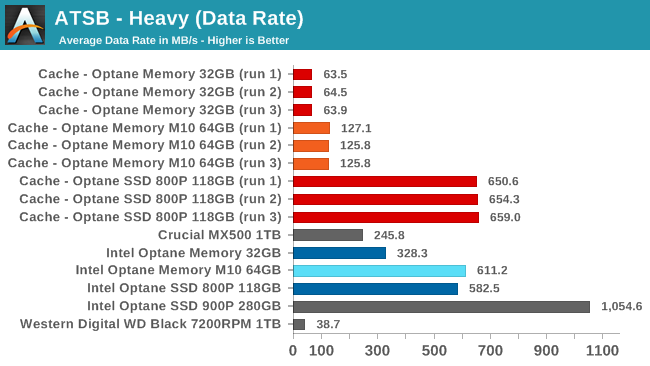
The 118GB Optane SSD 800P is the only cache module large enough to handle the entirety of the Heavy test, with a data rate that is comparable to running the test on the SSD as a standalone drive. The smaller Optane Memory drives do offer significant performance increases over the hard drive, but not enough to bring the average data rate up to the level of a good SATA SSD.
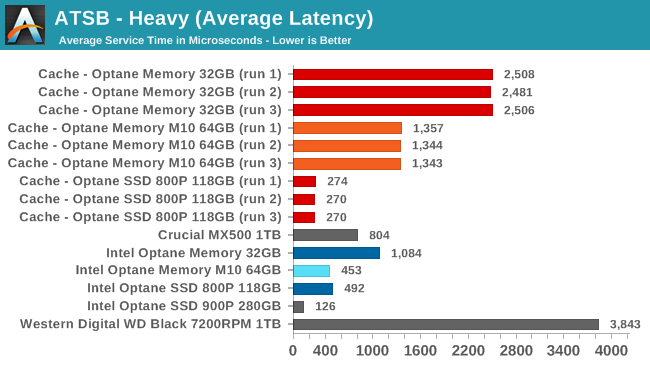
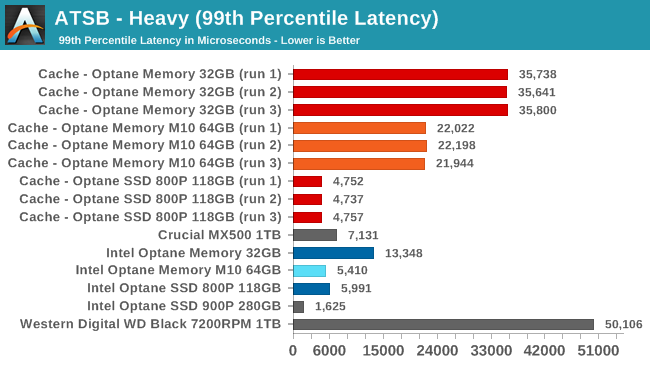
The 64GB Optane Memory M10 offers similar latency to the 118GB Optane SSD 800P when both are treated as standalone drives. In a caching setup the cache misses have a big impact on average latency and a bigger impact on 99th percentile latency, though even the 32GB cache still outperforms the bare hard drive on both metrics.
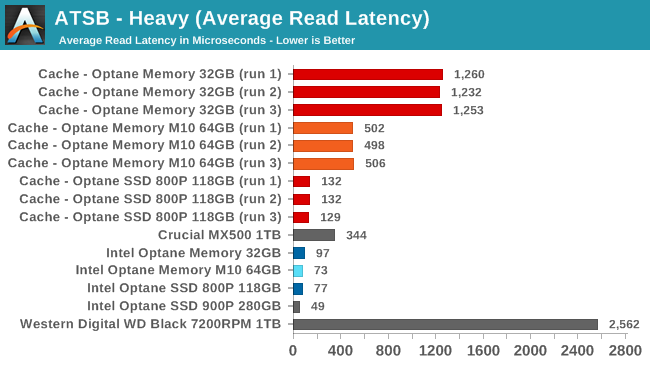
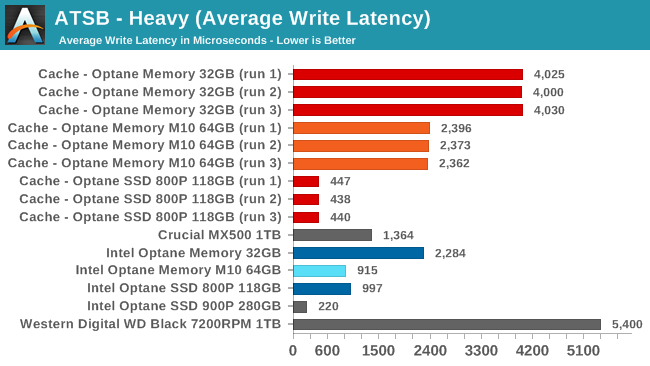
The average read latency scores show a huge disparity between standalone Optane SSDs and the hard drive. The 118GB cache performs almost as well as the standalone Optane drives while the 64GB cache averages a bit worse than the Crucial MX500 SATA SSD and the 32GB cache averages about half the latency of the bare hard drive.
On the write side, the Optane M.2 modules don't perform anywhere near as well as the Optane SSD 900P, and the 32GB module has worse average write latency than the Crucial MX500. In caching configurations, the 118GB Optane SSD 800P has about twice the average write latency of the 900P while the smaller cache configurations are worse off than the SATA SSD.
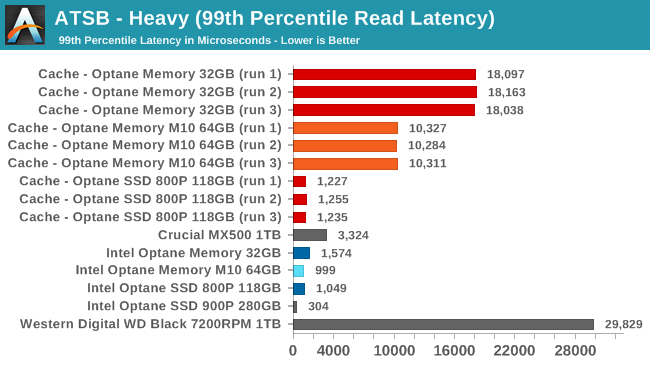
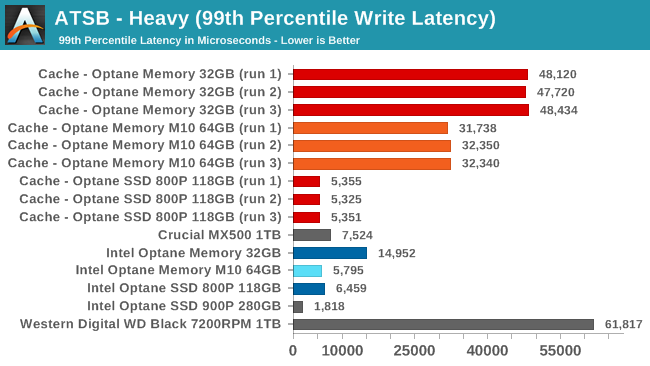
The 99th percentile read and write latency scores rank about the same as the average latencies, but the impact of an undersized cache is much larger here. With 99th percentile read and write latencies in the tens of milliseconds, the 32GB and 64GB caches won't save you from noticeable stuttering.










96 Comments
View All Comments
Samus - Wednesday, May 16, 2018 - link
For $160-$170 (<$150 on sale, basically the price of 64GB of Optane) you can get a the WD Black 512GB M2 NVME PCIe SSD that does 2000MB+/sec rear for all 512GB.Why the hell is Optane so expensive. 5-7x the price of traditional NAND?
Arnulf - Wednesday, May 16, 2018 - link
Because it is crap which nobody would buy if it was priced close to SSDs of similar performance and capacity:"It costs 5-7 times more than SSDs, must be something magical about it, let's buy one honey!"
Much like $1000 mobile phones, bait for the stupid.
CheapSushi - Wednesday, May 16, 2018 - link
Because it uses phase change instead of NAND and it's new tech. They're trying to recoup R&D cost.FunBunny2 - Wednesday, May 16, 2018 - link
"hey're trying to recoup R&D cost. "PCM is decades old tech. look it up. throwing good money after bad, just like pharma.
deil - Wednesday, May 16, 2018 - link
I have 8 TB drive AND I would enjoy some speedup as current usual run takes ~~5h full run. With that 32 GB joke drive even if it would not double the speed, Speedup of 20% time is a lot in my case. AND I don't get to redesign anything to use another drive or have to build 8 TB ssd raid.Spunjji - Wednesday, May 16, 2018 - link
On what basis do you think you'll achieve any speed-up, though?tipoo - Wednesday, May 16, 2018 - link
Yeah, I can't see why 5x the NAND for the cost wouldn't almost always be preferable for budget systems.I can only see this making sense for datacenter use.
0ldman79 - Thursday, May 17, 2018 - link
Primocache does the same thing.I've got an 80gig in my desktop, a 60 in an Asus laptop that has two 2.5 bays and a 16gig M.2 in my Inspiron 7559.
I don't use RAM as a buffer, just the SSD. Works great, unless you have an unstable system. Any time you lose power or don't shut down cleanly the cache resets. With the cache, however, my main box boots in about 20-30 seconds, all apps loaded, where as just running the mechanical drive a reboot is nearly a 4 minute affair.
lefty2 - Tuesday, May 15, 2018 - link
Ironically, these drives work better with AMD motherboards than Intel:https://fudzilla.com/news/pc-hardware/46145-amd-st...
CajunArson - Tuesday, May 15, 2018 - link
Where does Idiot-Zilla prove that Optane works "better" with AMD motherboards than Intel?But for a site that starts with "Fud" I will give them credit for dispelling the completely wrong "FUD" that is actually spread by AMD fanboys that Optane is a proprietary technology that only works with Intel products. Never has been proprietary.